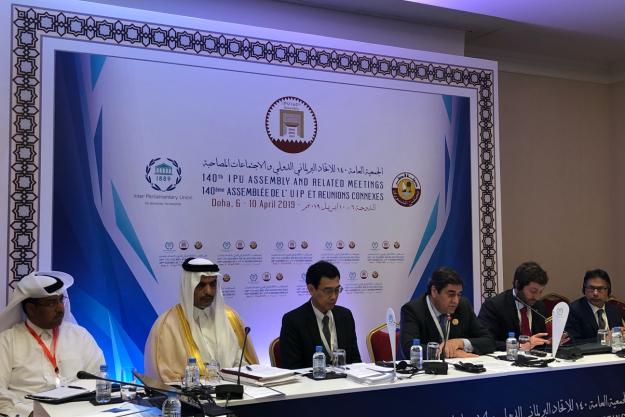
THE HAGUE, Netherlands — 19 April 2019 — Parliamentarians from Bangladesh, Chile, Qatar, Mongolia and Spain gathered on 7 April at a roundtable held during the 140th Assembly of the Inter-Parliamentary Union (IPU) in Doha, Qatar, to discuss more effective ways in which national lawmakers can work to enhance national implementation of the Chemical Weapons Convention (CWC).
The incumbent President of the IPU Standing Committee on Peace and International Security and Member of the Congress of Deputies of Spain, Mr Jose Ignacio Echaniz, opened the discussion that brought together over 30 participants. He stressed the critical role of parliaments in ensuring that states have effective legal mechanisms in place “as a preventive measure, as well as a tool for penalising any violation. He further stated: “Full and effective implementation of the Convention can work as a global security measure that substantially reduces the possibility of large-scale chemical warfare. National implementing legislation of the Convention may prevent terrorists from gaining access to materials that could be used in the development of chemical weapons.”
During the discussion, delegates from OPCW Member States participating in the IPU Assembly shared their national experiences in implementing the Convention.
Bangladeshi Member of Parliament (MP), Mr Abdus Salam Murshedy, stressed that a thorough understanding of the CWC objectives helps in building a grassroots appreciation of the role of the Convention in enhancing broader security. Mr Murshedy further shared the various education and outreach initiatives used in his country to promote the peaceful uses of chemistry.
Member of the Shoura Council of Qatar, Mr Mohamed bin Ali AlHanzab, noted the wider benefits deriving from national CWC implementation, which “serves not only as a security measure, but also helps in bolstering trade and protecting the environment”.
Member of the Chamber of Deputies of Chile, Mr Juan Antonio Coloma, shared his country’s progress in enacting CWC national legislation, noting that when adopted, it will enable Chile “to monitor all chemicals of concern and to impose punitive measures in cases of violation”.
Member of the State Great Hural and Vice-Minister for Foreign Affairs of Mongolia, Mrs Navaan-Yunden Oyundari, highlighted the importance of civil society participation in promoting peace, security and sustainable development. She expressed hope that the June regional meeting of CWC States Parties in Asia, taking place in Mongolia’s capital Ulaanbaatar, could serve as a platform for raising public awareness on how the CWC can serve as an effective tool against the re-emergence of chemical weapons.
The side event was organised by the OPCW Technical Secretariat in cooperation with the National Authority of Qatar.
Background
The IPU, which is the global organisation of parliaments, was founded 130 years ago and currently includes 178 member national parliaments and 12 regional parliamentary bodies.
The 140th Assembly of the IPU was held from 6 to 10 April in Doha, Qatar, with the participation of over 1600 delegates from 160 countries. Under the overarching theme of education for peace, the Assembly considered ways in which parliaments can take measures to counter terrorism, support human rights, promote gender equality and help mobilise investments in renewable energy.
As the implementing body for the Chemical Weapons Convention, the OPCW, with its 193 Member States, oversees the global endeavour to permanently eliminate chemical weapons. Since the Convention’s entry into force in 1997, it is the most successful disarmament treaty eliminating an entire class of weapons of mass destruction.
Over 96% of all chemical weapon stockpiles declared by possessor States have been destroyed under OPCW verification. For its extensive efforts in eliminating chemical weapons, the OPCW received the 2013 Nobel Peace Prize.
